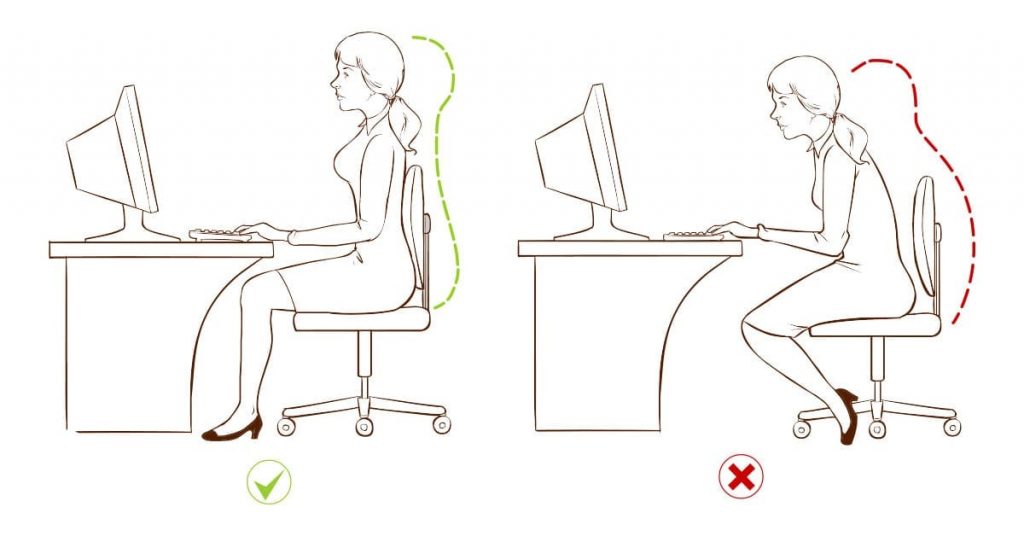PREVENTING NECK PAIN AT WORK
How often do we feel that terrible aching and/or stiffness in the neck while at work or shortly afterwards! …. it could be an agony sometimes, right?
Learning the proper way to sit at a computer or lift a box can help prevent neck pain while you’re in the office
Neck pain can be caused by any activity that puts a strain on your neck. One may feel pain at the base of his skull and down to his shoulders, another might claim feeling a knot in his neck, while a third might end up with a stiff neck. Most often, all of us will experience an associating headache. When pain intensifies, it will limit your ability to move your neck and hinders you from working and ruins all your plans for the day; work and afterwards.
Can my job be the reason behind my stiff aching neck?
Truly enough, if your neck pain starts while at work and gets worse by the end of the work day, it could be related to some stress placed on your neck while working. Most often, repetitive and continued work-related activities that negatively affect your neck muscles, ligaments, and tendons, are to blame for your neck pain and stiffness. Such activities include:
- Bending over a desk for hours
- The habit of holding your mobile phone between your bent neck and shoulder while occupying your hands with typing
- Holding your head forward to read a computer screen; evidence proves that just using a computer for a prolonged period of time can cause or aggravate neck pain especially if your computer monitor is positioned too high or too low
All the above can be augmented by some bad habits in daily life such as having poor posture while watching TV or reading, sleeping in an uncomfortable position, or twisting and turning your neck in a jarring manner while exercising.
Ever heard of Ergonomics at Work?
If you work at a computer station (and who`s not nowadays!), ergonomics can help you protect your neck. It is the science of refining the design of products to optimize them for human use. Computers and related products, such as computer desks and chairs, are frequently the focus of ergonomic design, it takes into consideration how your desk, chair, and computer monitor can be placed to decrease the stress on your neck.
Ergonomics offers you the key to protecting your neck, through maintaining your head and neck in a neutral position that preserves the natural curve of the part of your spine that supports your head; the cervical spine.
The following tips are gold; apply them to safeguard your neck:
- Reform your workstation. Adjust your chair so that your computer screen is at eye level and directly in front of you. Your elbows should be parallel to the ground and your arms should reach your keyboard comfortably. Your feet should be flat on the floor and the back of your chair should be in an erect position. You should be able to read your computer screen without hanging your head down (= monitor is too low), or tilting it back (=monitor is too high), or craning your neck forward (= monitor is far away).
- Lift properly. If you have to lift heavy stuff in your office, keep in mind that there`s always a risk for your neck And back. Protect your cervical spine by standing close to the stuff you need to lift. Bend at your hips and knees. Let the big muscles of your hips and legs bear the weight up. Hold the heavy weight close to your body. A word of advice, don`t risk it; ask for help.
- Get a headset for your phone. If you are having a conversation over the phone, avoid holding the phone between your ear and shoulder while bending the neck. Use a headset, a Bluetooth, or even the speaker phone as much as possible.
- Have a break … have a stretch. No matter how perfect your office-chair posture is, it is imperative to get up and move around every half-hour. Prolonged sitting has been linked to worsening of neck pain. Stretching can definitely be helpful. Relax your arms, roll your shoulders in a circular motion, and gently roll your head from side to side. All this loosens the muscles and helps clear your mind.
You … yes you: Knowing what triggers neck pain at work can go a long way toward preventing it. Make the effort to arrange your work area to minimize strain on your neck.
If neck pain is associated with compression of one of your nerves, you may feel numbness, tingling, or weakness in your arm, hand, or elsewhere.
When to Contact a Medical Professional?
Seek medical help right away if:
- Symptoms do not go away in 1 week with self-care and/or over-the-counter pain killers
- You have numbness, tingling, or weakness in your arm or hand
- The pain gets worse when you lie down or wakes you up at night
- Your pain is so severe that you cannot perform your daily routine
Your neck deserves all the care you can give … start now!








